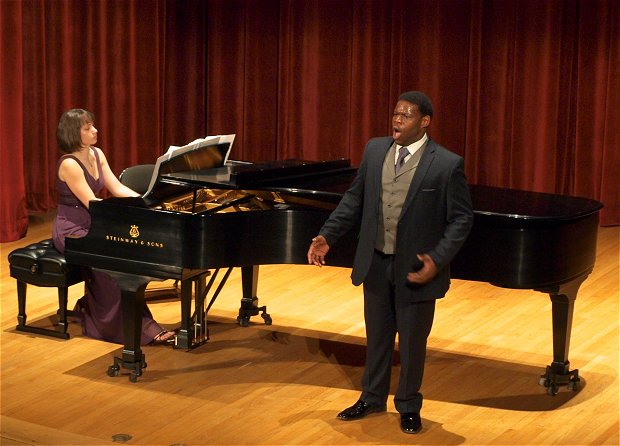 Photo by Casey So Hyeun Cho
Photo by Casey So Hyeun Cho
This article originally appeared on Soundfly.
The ability to accompany a singer is an incredibly useful skill that all pianists should have in their toolkit. It may feel like you're playing second fiddle, especially if you've defined yourself as a solo act, but learning to accompany will prepare you for playing in a band, and may even prove to be seriously lucrative in the long run. Would it be so bad to have music as your day job and night job? I think not!
So, what does it take to be a good accompanist? It isn't one single strength, but a combination of skills, tricks, flubs, and essentially faking it 'til you make it. If you can successfully sit down and combine the following steps, you're off to a great start and possibly a new revenue stream – accompanying auditions, subbing in with bands, and playing classes.
1. Leave your ego at the door
This is a big one. An accompanist cannot come with a personal agenda. This is not your show. Your one lone responsibility is to help the singer look and sound amazing. You can't go into the audition room, cabaret space, or dive bar with a chip on your shoulder thinking that you should be the center of attention.
2. Practice sight-reading
This is not a suggestion. It should be tattooed on your forehead. Print out some random sheets online or pick up a songbook on Amazon and play through tons of songs without stopping. Set a metronome and stick to the beat. The more songs you play, the more you'll recognize recurring themes, key signatures, and styles that many songs have in common.
3. Don't sweat the right hand
A teacher once told me that the best thing an accompanist can do is serve as the rhythm section. The singer is listening for rhythmic cues that live in the bassline. Maybe you can easily play all the fun, ornamental stuff in the right hand – woohoo for you! Chances are, though, if you're sight-reading a piece for the first time, you're not going to hit every note. You have to be okay with that and press on. Learn to weed out the unneeded, challenging parts and hammer out the essentials in the left hand that drive the song.
4. Become one with chord symbols
Practice making these bad boys second nature. Chord symbols are a heads-up way of quickly letting a pianist know what to play in the left hand. Not all sheet music has them, but if you're lucky to get a song that does, you'll instantly be able to accompany and improvise along with the singer. Is it perfect accompaniment? No, you won't get the specific chord voicings right every time, which won't fly at the professional level. But will it impress your coworkers at the office sing-along? You bet your sweet chord symbols it will! It's also enough to accompany yourself on a song if you're learning something new or plotting your star turn at an open mic night.
5. Listen and follow
The singer is your Jon Snow. You should be willing to follow him or her into battle on the other side of the wall with undying commitment and purpose. But seriously, listen to the singer. If you haven't seen the piece before – hell, even if you have – ask the singer to hum a few bars at the tempo he or she would like. Don't push the tempo, even if it's steadily decelerating. Listen for the singer's interpretation of the song and follow along.
6. Plan ahead
Leaf through the music, making mental notes of difficult page turns, key changes, tempo changes, and challenging sections. If you don't know how a particular part of the song goes… ask. The singer will appreciate it and tell all of his or her friends about how the accompanist really made an effort. A little goes a long way, especially when a singer's nerves are involved.
If you follow these simple steps and put in the practice time, you'll find that this once harrowing task flows far more easily than it used to. You'll find yourself aching to tackle new and challenging pieces, and your overall playing will improve in the long run. Win, win!
Jonathan Hack is a Brooklyn resident, musician, writer, and ping pong aficionado. His career in the theatre has spanned acting, music direction,production, carpentry, and more. As a marketer he has worked with major brands in music and fashion. He is a proud member of AEA and NATS. Follow him on Twitter @writerninja and on Instagram @jonnyhack.







